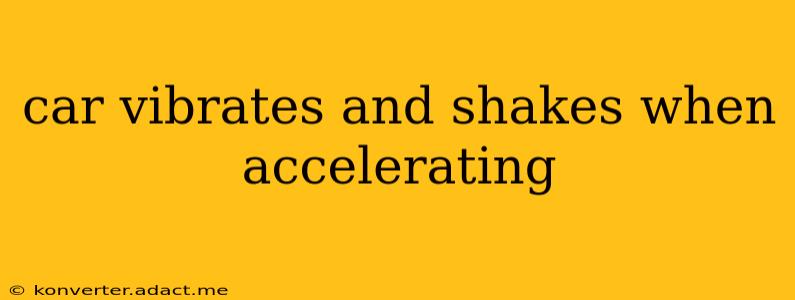Experiencing a vibrating and shaking car while accelerating can be alarming, but understanding the potential causes can help you diagnose and resolve the issue. This comprehensive guide explores the common culprits behind this problem, offering insights into potential solutions and preventative measures. Ignoring this issue can lead to further damage and potentially dangerous driving conditions.
Why Does My Car Shake When I Accelerate?
This is the core question many drivers ask. The truth is, several factors can contribute to a vibrating or shaking sensation during acceleration. The issue could be relatively minor, such as needing a tire rotation, or it could indicate a more serious mechanical problem requiring professional attention.
What Causes a Car to Vibrate While Accelerating?
Several components in your vehicle can cause vibration and shaking during acceleration. Let's break down the most common causes:
1. Worn-Out or Uneven Tires:
This is a frequent culprit. Uneven tire wear, improper inflation, or damaged tires can cause noticeable vibrations, especially when accelerating. The vibrations often increase with speed. Solution: Check your tire pressure, inspect your tires for wear and tear (including the sidewalls), and consider a tire rotation and/or replacement if necessary.
2. Problems with the Drive Shaft:
The drive shaft transmits power from the engine to the wheels. If it's bent, damaged, or worn, it can create vibrations felt throughout the car, particularly during acceleration. Solution: A professional mechanic needs to inspect the drive shaft for damage. Replacement or repair may be necessary.
3. Issues with the Transmission:
Problems within the transmission, such as worn-out mounts or internal damage, can result in vibrations felt during acceleration. This is often accompanied by other symptoms, such as difficulty shifting gears or unusual noises. Solution: A transmission inspection by a qualified mechanic is essential to diagnose the specific problem and determine the appropriate repair or replacement.
4. Engine Misfire:
An engine misfire occurs when one or more cylinders fail to ignite properly. This can cause a noticeable shaking and loss of power, especially under acceleration. Solution: A diagnostic check by a mechanic will pinpoint the misfiring cylinder(s). Possible solutions range from replacing spark plugs and wires to addressing more significant engine problems.
5. Worn-Out Wheel Bearings:
Wheel bearings support the wheels and allow them to rotate smoothly. If they are worn, they can create vibrations that increase with speed and during acceleration. Solution: A mechanic should inspect the wheel bearings. Replacing worn-out bearings is the usual solution.
6. Unbalanced Wheels or Rims:
Wheels and rims that are out of balance can cause vibrations, especially at higher speeds and during acceleration. Solution: A tire shop can easily balance your wheels to address this issue.
7. Suspension Problems:
Worn-out suspension components, such as shocks, struts, or bushings, can affect the car's stability and lead to vibrations, particularly during acceleration. Solution: A mechanic needs to inspect the suspension system. Replacing worn parts is typically required.
8. CV Joint Problems:
Constant Velocity (CV) joints allow the drive shaft to transmit power to the wheels while turning. Worn or damaged CV joints can create vibrations and clicking noises, especially during acceleration and cornering. Solution: A mechanic needs to inspect and replace the damaged CV joint(s).
When Should I Take My Car to a Mechanic?
If the vibration is severe, persistent, or accompanied by other symptoms like strange noises or loss of power, it's crucial to take your car to a trusted mechanic immediately. Delaying repairs can lead to more significant damage and potentially dangerous driving conditions.
How Much Does it Cost to Fix a Vibrating Car?
The cost to repair a car that vibrates during acceleration varies considerably depending on the cause. A simple tire rotation might cost a few tens of dollars, while more complex issues like transmission problems or engine misfires can cost hundreds or even thousands.
This guide offers a comprehensive overview. However, diagnosing the exact cause requires a professional inspection. Don't hesitate to consult a qualified mechanic for accurate diagnosis and repair. Remember, your safety is paramount.
